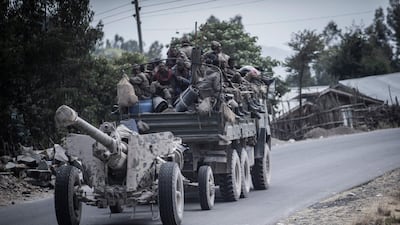The United States and five of its allies called on Ethiopia on Monday to release ethnic Tigrayans that Prime Minister Abiy Ahmed’s government has detained amid advances from the Tigray People’s Liberation Front (TPLF) on Addis Ababa.
Washington joined Canada, Britain, the Netherlands, Denmark and Australia in a statement noting that the six countries are "profoundly concerned by recent reports of the Ethiopian government’s detention of large numbers of Ethiopian citizens on the basis of their ethnicity and without charge."
The state of emergency Mr Abiy declared last month is “no justification for the mass detention of individuals from certain ethnic groups," the statement noted, calling for “unhindered and timely access by international monitors.”
Mr Abiy declared the state of emergency after the TPLF joined several other militias to make advances on Addis Ababa.
The prime minister, who won the 2019 Nobel Peace Prize, has since appeared on the front lines of the conflict.
The joint statement pointed to reports from Addis Ababa’s own Ethiopian Human Rights Commission as well as independent watchdog Amnesty International documenting “widespread arrests of ethnic Tigrayans, including Orthodox priests, older people and mothers with children” being held without trial in “inhumane" conditions.
A US official noted last month that some of the detainees include US-Ethiopian dual nationals.
Washington has sought to bring the Ethiopian government and the TPLF to the negotiating table as the Tigray conflict spills over to the rest of the country and threatens the capital.
President Joe Biden's administration has gone so far as to halt a legal review into whether human rights abuses in Tigray amount to a genocide in the hopes of persuading Mr Abiy’s government to start talks.
However, the Biden administration has also announced Ethiopia’s expulsion from the African Growth and Opportunity Act, which provides eligible countries with duty-free access to the US market, citing human rights atrocities.
The US has also sanctioned some Eritrean military officials who oversee forces backing Ethiopian troops in the conflict.
Monday's statement also voiced “grave concern” over human rights abuses from all sides of the conflict, noting that “all parties must comply with their obligations under international humanitarian law."
Amnesty International has documented sexual violence and civilian casualties in Tigray at the hands of Ethiopian forces and their allies.
The human rights organisation has also documented similar human rights abuses against civilians in neighbouring Amhara at the hands of the TPLF.
Ethiopia has cut internet, phone and media access in Tigray since the conflict erupted last year while reportedly complicating or halting the delivery of humanitarian aid to the war-torn region.
Witnesses have described widespread human rights abuses in Tigray, including the displacement and murder of civilians, gang rapes, the destruction of civilian infrastructure and the burning of crops.
The UN World Food Programme on Monday noted that its $579 million funding shortfall is “threatening its ability to meet the critical food and nutrition needs of millions of food insecure Ethiopians and refugees.”
The agency said it requires $316 million “to deliver emergency food and nutrition assistance to 3.7 million people in Northern Ethiopia over the next six months.”
Squad for first two ODIs
Kohli (c), Rohit, Dhawan, Rayudu, Pandey, Dhoni (wk), Pant, Jadeja, Chahal, Kuldeep, Khaleel, Shami, Thakur, Rahul.
Specs
Engine: 51.5kW electric motor
Range: 400km
Power: 134bhp
Torque: 175Nm
Price: From Dh98,800
Available: Now
PROFILE OF HALAN
Started: November 2017
Founders: Mounir Nakhla, Ahmed Mohsen and Mohamed Aboulnaga
Based: Cairo, Egypt
Sector: transport and logistics
Size: 150 employees
Investment: approximately $8 million
Investors include: Singapore’s Battery Road Digital Holdings, Egypt’s Algebra Ventures, Uber co-founder and former CTO Oscar Salazar
The years Ramadan fell in May
MATCH INFO
Azerbaijan 0
Wales 2 (Moore 10', Wilson 34')
Profile of Tarabut Gateway
Founder: Abdulla Almoayed
Based: UAE
Founded: 2017
Number of employees: 35
Sector: FinTech
Raised: $13 million
Backers: Berlin-based venture capital company Target Global, Kingsway, CE Ventures, Entrée Capital, Zamil Investment Group, Global Ventures, Almoayed Technologies and Mad’a Investment.
Western Region Asia Cup T20 Qualifier
Sun Feb 23 – Thu Feb 27, Al Amerat, Oman
The two finalists advance to the Asia qualifier in Malaysia in August
Group A
Bahrain, Maldives, Oman, Qatar
Group B
UAE, Iran, Kuwait, Saudi Arabia
UAE group fixtures
Sunday Feb 23, 9.30am, v Iran
Monday Feb 25, 1pm, v Kuwait
Tuesday Feb 26, 9.30am, v Saudi
UAE squad
Ahmed Raza, Rohan Mustafa, Alishan Sharafu, Ansh Tandon, Vriitya Aravind, Junaid Siddique, Waheed Ahmed, Karthik Meiyappan, Basil Hameed, Mohammed Usman, Mohammed Ayaz, Zahoor Khan, Chirag Suri, Sultan Ahmed
T20 World Cup Qualifier
October 18 – November 2
Opening fixtures
Friday, October 18
ICC Academy: 10am, Scotland v Singapore, 2.10pm, Netherlands v Kenya
Zayed Cricket Stadium: 2.10pm, Hong Kong v Ireland, 7.30pm, Oman v UAE
UAE squad
Ahmed Raza (captain), Rohan Mustafa, Ashfaq Ahmed, Rameez Shahzad, Darius D’Silva, Mohammed Usman, Mohammed Boota, Zawar Farid, Ghulam Shabber, Junaid Siddique, Sultan Ahmed, Imran Haider, Waheed Ahmed, Chirag Suri, Zahoor Khan
Players out: Mohammed Naveed, Shaiman Anwar, Qadeer Ahmed
Players in: Junaid Siddique, Darius D’Silva, Waheed Ahmed
WHY%20AAYAN%20IS%20'PERFECT%20EXAMPLE'
%3Cp%3EDavid%20White%20might%20be%20new%20to%20the%20country%2C%20but%20he%20has%20clearly%20already%20built%20up%20an%20affinity%20with%20the%20place.%3Cbr%3E%3Cbr%3EAfter%20the%20UAE%20shocked%20Pakistan%20in%20the%20semi-final%20of%20the%20Under%2019%20Asia%20Cup%20last%20month%2C%20White%20was%20hugged%20on%20the%20field%20by%20Aayan%20Khan%2C%20the%20team%E2%80%99s%20captain.%3Cbr%3E%3Cbr%3EWhite%20suggests%20that%20was%20more%20a%20sign%20of%20Aayan%E2%80%99s%20amiability%20than%20anything%20else.%20But%20he%20believes%20the%20young%20all-rounder%2C%20who%20was%20part%20of%20the%20winning%20Gulf%20Giants%20team%20last%20year%2C%20is%20just%20the%20sort%20of%20player%20the%20country%20should%20be%20seeking%20to%20produce%20via%20the%20ILT20.%3Cbr%3E%3Cbr%3E%E2%80%9CHe%20is%20a%20delightful%20young%20man%2C%E2%80%9D%20White%20said.%20%E2%80%9CHe%20played%20in%20the%20competition%20last%20year%20at%2017%2C%20and%20look%20at%20his%20development%20from%20there%20till%20now%2C%20and%20where%20he%20is%20representing%20the%20UAE.%3Cbr%3E%3Cbr%3E%E2%80%9CHe%20was%20influential%20in%20the%20U19%20team%20which%20beat%20Pakistan.%20He%20is%20the%20perfect%20example%20of%20what%20we%20are%20all%20trying%20to%20achieve%20here.%3Cbr%3E%3Cbr%3E%E2%80%9CIt%20is%20about%20the%20development%20of%20players%20who%20are%20going%20to%20represent%20the%20UAE%20and%20go%20on%20to%20help%20make%20UAE%20a%20force%20in%20world%20cricket.%E2%80%9D%C2%A0%3C%2Fp%3E%0A
How to donate
Send “thenational” to the following numbers or call the hotline on: 0502955999
2289 – Dh10
2252 – Dh 50
6025 – Dh20
6027 – Dh 100
6026 – Dh 200
UAE currency: the story behind the money in your pockets
Most%20polluted%20cities%20in%20the%20Middle%20East
%3Cp%3E1.%20Baghdad%2C%20Iraq%3Cbr%3E2.%20Manama%2C%20Bahrain%3Cbr%3E3.%20Dhahran%2C%20Saudi%20Arabia%3Cbr%3E4.%20Kuwait%20City%2C%20Kuwait%3Cbr%3E5.%20Ras%20Al%20Khaimah%2C%20UAE%3Cbr%3E6.%20Ash%20Shihaniyah%2C%20Qatar%3Cbr%3E7.%20Abu%20Dhabi%2C%20UAE%3Cbr%3E8.%20Cairo%2C%20Egypt%3Cbr%3E9.%20Riyadh%2C%20Saudi%20Arabia%3Cbr%3E10.%20Dubai%2C%20UAE%3C%2Fp%3E%0A%3Cp%3E%3Cem%3ESource%3A%202022%20World%20Air%20Quality%20Report%3C%2Fem%3E%3C%2Fp%3E%0A
MOST%20POLLUTED%20COUNTRIES%20IN%20THE%20WORLD
%3Cp%3E1.%20Chad%3Cbr%3E2.%20Iraq%3Cbr%3E3.%20Pakistan%3Cbr%3E4.%20Bahrain%3Cbr%3E5.%20Bangladesh%3Cbr%3E6.%20Burkina%20Faso%3Cbr%3E7.%20Kuwait%3Cbr%3E8.%20India%3Cbr%3E9.%20Egypt%3Cbr%3E10.%20Tajikistan%3Cbr%3E%3Cbr%3E%3Cem%3ESource%3A%202022%20World%20Air%20Quality%20Report%3C%2Fem%3E%3C%2Fp%3E%0A













